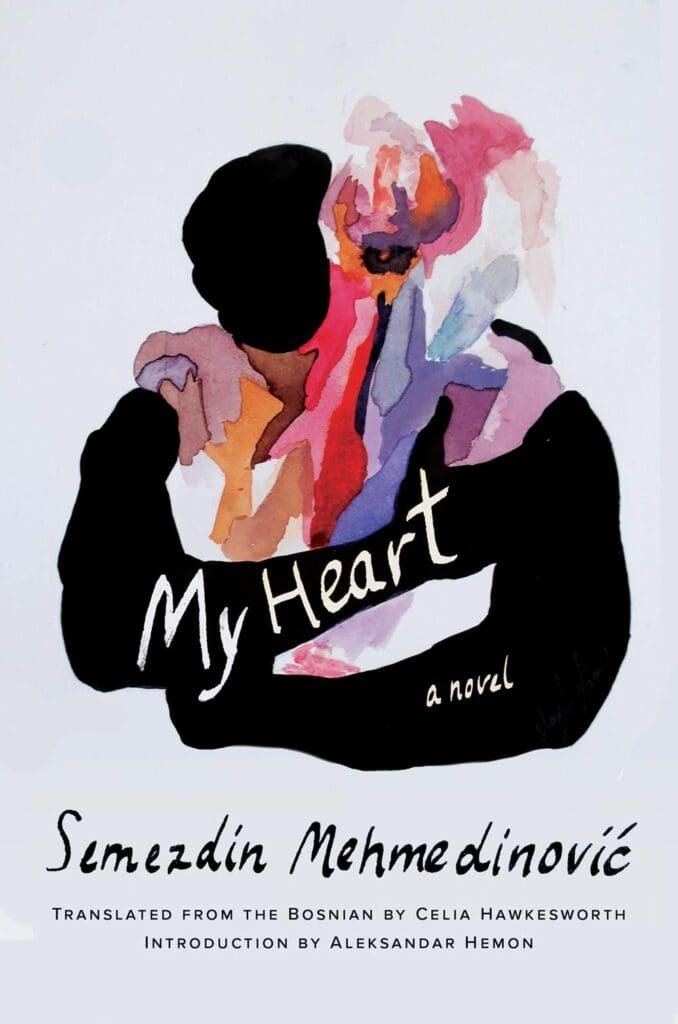People say that when you have a child, it’s like your heart has left your body and begins walking around on its own. This idea came to mind reading Semezdin Mehmedinović’s novel My Heart (225 pages; Catapult; translated by Celia Hawkesworth). It begins with a heart attack that sends the protagonist into an eloquent, existential spiral, after which his priorities become increasingly clear to him. “Since I passed fifty,” he explains, “I know that everyone dies young.” The overall effect is of a camera sharpening: the background noise gives way to a crisp foreground, the local details of love and relationships. The title refers not to any literal heart, but to the ultimate objects of the narrator’s love—his son and wife.
Notably, the narrator of My Heart is also named Semezdin Mehmedinović. Mehmedinović the author slyly references this in an exchange of dialogue where a writing professor skeptically asks, “The character in the story has the same name as you?” To which the answer is simply, “Yes, but that’s because this story is about me, I am a character in the story.” (To distinguish the two, I will henceforth refer to the narrator as Semezdin and the author as Mehmedinović.)
This slight yet major existential novel is structured in three parts. The first, the shortest, details Semezdin’s heart attack. The second, much longer section takes the form of a letter to his adult son. The book is itself a kind of letter, a record of subtle, intimate moments Semezdin is committing to paper for the people he loves. This becomes clear by the third part, when his wife Sanja suffers a stroke, which causes the couple to recall the details of their life together. The wife struggles to remember as a result of the stroke. “And I believe,” Semezdin notes, “that she will emerge from her forgetfulness, as one emerges from a dark cinema into the light of a lively city.”
But if much of the book is about home, then the shadow side of that is displacement (“in fact, I am a foreigner everywhere in the world: as soon as I leave my home, I step into a void”). Each of the book’s three sections takes Semezdin away from comfort in some way, mirroring his original displacement as an immigrant from Bosnia. That displacement presents itself most clearly through language. Semezdin, a poet, a lover of words, observes the divergence between himself and his son:
What language are we speaking? When we came here, you were young enough to adopt the rules of your new world without resistance, and for your new language to be closer to you than the one you arrived with. It was different for me, as I haven’t managed to tear myself away from the past, which means that I’m a prisoner of my language. Does that mean that you and I, father and son, speak different languages?
Semezdin writes in his own language, emphatically. As if proof of this non-urgency about English, the 2021 version of My Heart follows the Bosnian, which was originally published in 2017. Semezdin reflects:
My world is in my language…I have chosen to remain a foreigner. Once, some ten years ago, after the translation of my second book came out, an American poet explained to me, in a restaurant in Iowa, that all my problems would be solved as soon as I started writing in English. She said, very seriously, that I should just make a rough translation of my poems, she’d sort out the language, and then I could publish them as originals. She literally suggested that. I said that I didn’t have any problems that needed solving…She looked at me as though she had just found out that I had a disease from which I would soon die.
Mehmedinović writes with the freedom of a person who assumes he won’t be read widely. Loosely he threads scenes, sometimes embellishing them with his own scribbly illustrations, which are included without preamble or justification. It feels, in other words, like a genuine piece of art, not a product to be capitalized on. Mehmedinović seems to take pride in this. (At one point, Semezdin’s wife Sanja, referring to Barnes & Noble, says: “There’s nothing in this shop. They only have books that sell well here.”)
Despite this rejection of commercial appeal, My Heart deserves to be read widely, and closely. Each sentence is smooth and precise, cerebral but never grandiose. In Mehmedinović’s novel, life and death emerge most vibrantly alongside one another.

